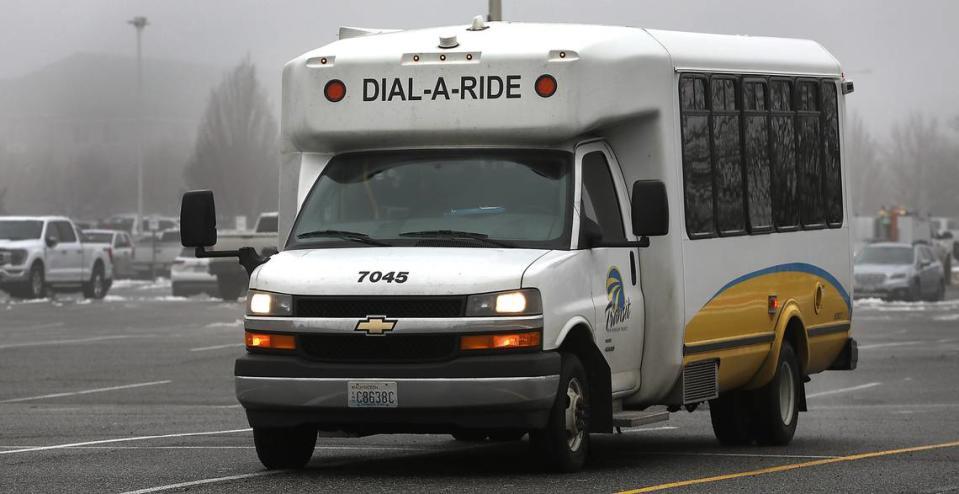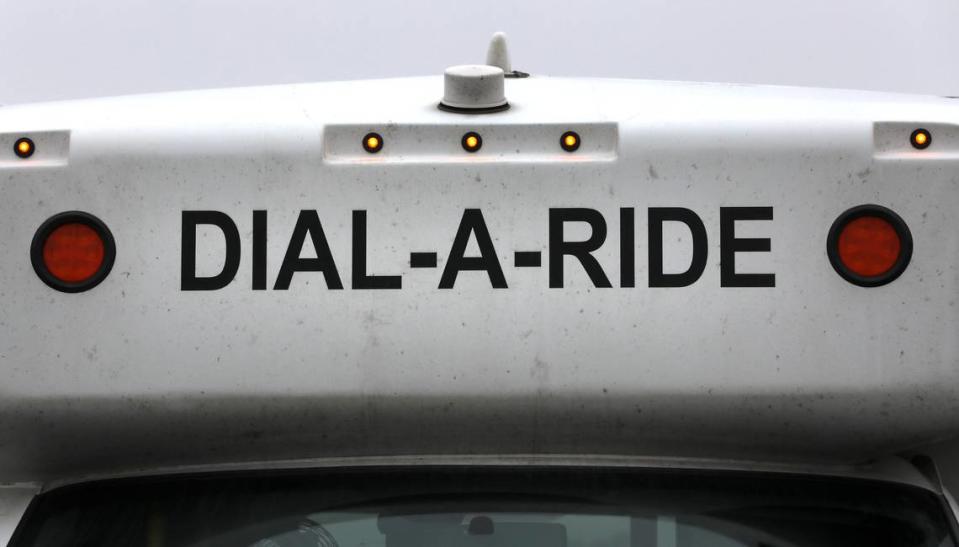‘Engaging in life.’ Why a Tri-Citian who depends on Dial-A-Ride fears coming changes
Jane Campbell put a lot of trust in Dial-A-Ride when she gave up her car and switched to the service to help her remain safe and independent. And in that time, the drivers have exceeded her expectations and seeing them has become a favorite part of her week.
Like many Dial-A-Ride users, the 72-year-old retired engineer relies on the shuttle to help her continue living life on her terms and to stay safe while still getting to stores, medical appointments and more.
For many riders, that ability to remain independent is a huge reason they use the service. Now some are worried they won’t get the same high standard of quality or access to service when Ben Franklin Transit outsources overflow calls to a contractor.
The transit agency says the new agreement with Via to take on calls drivers can’t get to will be limited to riders who are able to walk, allowing Dial-A-Ride drivers to remain focused on those needing more help.
But without plans in place, some riders and drivers alike are skeptical about how Via, which currently operates the Connect shuttles, will manage up to 70 ADA overflow calls each day.
Transit officials say those details will be worked out over the coming months. But the contract adjustment, worth up to $3 million, has already been approved.

The changes are an adjustment of Via’s current contract and also include limited busing services in Prosser and Benton City and a proposed shuttle service to the Tri-Cities Airport.
Via only has two handicap-accessible vehicles right now, according to a recent presentation to the BFT board before approving the contract changes. The majority of its fleet are minivans.
Campbell worries the changes, which would see some calls being shifted from fully handicap accessible shuttles to minivans, could leave behind many seniors who rely on the service.
“We should be a compassionate society and just because you and your mother never need Dial-A-Ride, doesn’t mean you should abandon the rest of us without any way to get anywhere,” she said. “Don’t abandon people who need that. For a lot of people, that’s their only touch with the outside world.”
Campbell told the Tri-City Herald that the problem is that she, and many other riders she knows, often don’t know how they’re going to be feeling when it comes time to be picked up. While she can get around on her own some days, other days she’s using a walker or power chair due to flair ups with her medical conditions.
She lives in a senior living building, Vintage at Richland, with an elevator that isn’t reliable, which can leave her and other seniors having to navigate up to three flights of stairs. On those days she’s worn out by the time she gets to the lobby.
“When the elevator is down I will be tired and not very able ... I will be more tired, it will be more unpredictable,” she said. “So, what if I have scheduled a ride and it’s supposed to be with Via and then I need my walker and they don’t have room for it? What do I do then? How are they going to handle that? That’s a real problem for me.”

Campbell recently had surgery on her hand and doesn’t think she can climb in and out of a van even on the days she might not need the power chair or walker. She’s not sure how she would manage to move around a van with other riders or how it could fit groceries and mobility devices for more than a single rider. There’s a concern about fall risks as well if the vans aren’t equipped with stairs to help riders get in and out.
Campbell believes that any changes that make getting around more difficult will have real impacts on the health of riders. Being able to maintain independence is not just good for them mentally, but also helps riders maintain an active social life and gets them out of the house and stay more physically active, she said.
“One of the things that keeps people able to continue living independently throughout their life is the amount of social interaction they get and the amount of independence they have,” she said. “If they take away our independence and make it difficult to use a ride service, if they make it more expensive or complicated, it’s not going to work and people will get old faster and have more illnesses because that’s what happens when you can’t engage in life.”
Worn out drivers
Campbell said she understands the drivers are overworked, but doesn’t think outsourcing the jobs is a better solution than hiring more drivers to fill already open positions.
“My guess is that Via drivers are paid by how many trips they can make and if they’re impatient and they want to do things in a hurry that is not going to work, because I can’t hurry,” she said.
Via typically offers drivers a choice between an hourly rate and a per-ride rate, similar to services such as Uber, according to its website. It’s unclear whether the payment structure would differ for the overflow Dial-A-Ride calls.
Instead of filling the 14 Dial-A-Ride driver positions currently open, the transit agency plans to close out those jobs.

More than anything, Campbell is concerned that the kind, caring drivers she’s gotten used to are being rewarded for their hard work by being pushed out.
“I think they’re tired and I think that may have caused some of them to be unwell. Even the ones who have (worked weeks without days off) are very cheerful to me,” she said. “It requires a significant amount of training, and they’re trained by other drivers who knows what kind of help everyone needs.”
She said knowing that these drivers care about their riders means the world to her.
“It means everything to me, honestly I don’t know if I could survive without Dial-A-Ride,” she said. “I like to go out and do things, I don’t do well when I’m cooped up in my house all the time and they are cheerful and helpful. If I couldn’t get out, and I didn’t have a way to get out, I don’t know what I would do.”
Drivers have described the move as an attempt to privatize the service and skirt their union.
Campbell agrees, and she’s skeptical that using a contractor is a better solution than filling open positions.
“There are times when they don’t have a heavy load on a Dial-A-Ride bus that I’m on, but I think the answer is just give them enough pay to keep hiring more drivers,” she said. “I don’t think the answer is going to Via. I think they need to keep the drivers going and make sure there are enough of them so that they don’t quit.”
She said it bothers her to hear the blame being put on the drivers who are out there doing their best for riders every day.
Union representative, Russell Shjerven, has told the Herald that Dial-A-Ride drivers miss work more often than standard BFT bus route drivers because their work makes them more prone to injury and illness, because a big part of their work involves assisting medically fragile riders and taking sick people to medical appointments.

He said those circumstances combined with weeks of no days off because BFT hasn’t hired for more than a dozen open Dial-A-Ride positions has left drivers burnt out.
“I think it’s a union busting move, they’ve got a good union and (management) wants to get rid of it,” Campbell said. “(The drivers) are not lazy, they’re always ready to go in and help you with anything, they don’t sit and wait for you to come out. And they’re always looking at where everybody needs to be and what time you need to be there. They communicate very well.”
She wants the board look into other cost-cutting options, such as designated weekly or bi-weekly group shopping trips for senior living facilities which would cut down on the number of individual calls for rides to the grocery store.
Advocating for her friends
While BFT’s leadership team has told the transit board that short staffing has led to drops in on-time rates, the agency has been unwilling to share that data, telling the Herald they were unable to accommodate a timely response to the request under the Washington Public Records Act due to a high volume or public record inquiries.
The most recent rider data on its website is from late 2021, though the reports are still being presented to the board. The most recent performance data presented did not include on-time rates.
Campbell said that in her year and a half riding with Dial-A-Ride, she only recalls being late a couple times. She said she never misses an opportunity to chat with other passengers, but has only heard of one person who reportedly missed an appointment. She believes that missed appointments are unusual.
While BFT couldn’t share its on-time rates, they have said their pickup rates are at 100%, meaning everyone who order service from Dial-A-Ride always get a ride.

Campbell said she’s OK with waiting a little longer to be picked up after appointments because she knows drivers are prioritizing getting other passengers to appointments on time.
She said that her friends either don’t know about the coming changes or they’ve got questions no one can seem to give them answers to.
So, after talking with other residents in her senior living facility and with friends and fellow passengers, she took it upon herself to share her concerns with the transit board.
“I am making them aware of it. I’m trying to make sure people understand,” she said. “People are concerned about anything besides Dial-A-Ride because Dial-A-Ride is spacious and easy to use, the minivans are not going to be. The predictability, I’m just going to keep saying that, of what my health is going to be like that day is a big deal because I don’t know what my health is going to be like and neither do a lot of other people.”
She wasn’t feeling well the day of the February BFT meeting and the BFT board stopped allowing the public to comment via online Zoom sessions in January.
So, Campbell submitted her questions in writing ahead of the meeting. She’s hoping they’ll get some answers.

At that meeting, the board listened to a packed house of passengers who depend on Dial-A-Ride, just like Jane Campbell, pleading with the board to be more transparent and to reconsider their Dial-A-Ride overflow decision.
Campbell hopes that before the board makes any permanent decisions, they take time to listen to the people who would be impacted by the changes.
She said that there are fixed-income seniors in her building who are just barely making it and cannot afford to call an Uber.
Now she fears they’re going to have to choose between physical worries about climbing in and out of minivans or damage to their mobility devices and getting to necessary appointments.
“It’s frustrating to not know (what changes are being made), they say they’re going to give more information before they do it, but my concern is they’re going to make a decision and then give us the information based on decisions they’ve already made that they’re unable to change,” she said.

